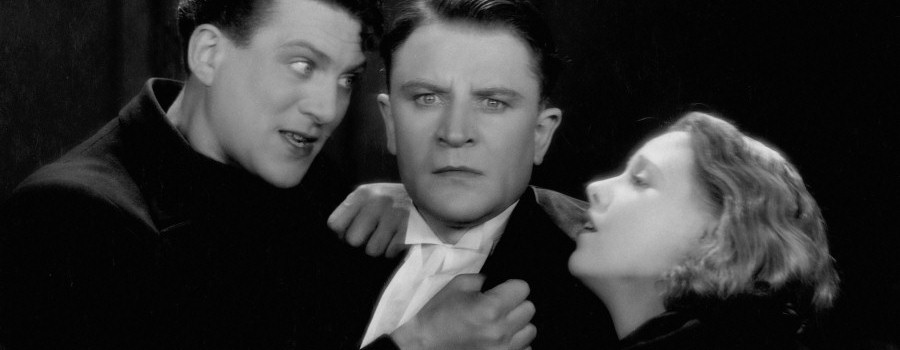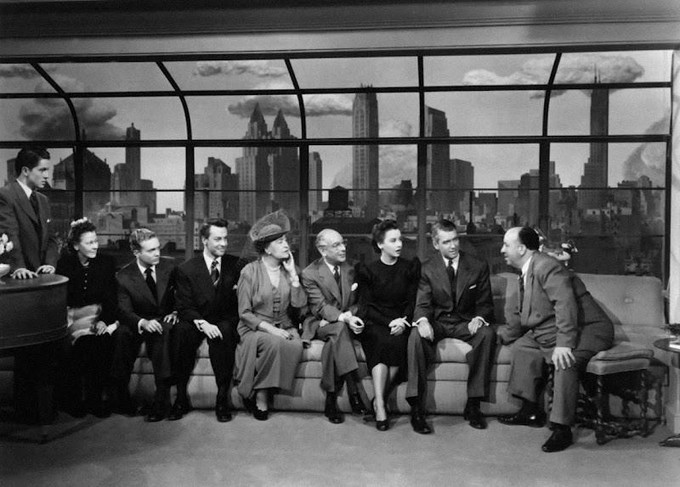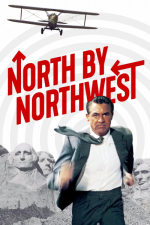DiscussionHQ - General Discussions
DiscussionHQ is a general discussion forum that has opened December 2024!
We provide a laid back atmosphere and our members are down to earth. We have a ton of content and fresh stuff is constantly being added. We cover all sorts of topics, so there's bound to be something inside to pique your interest. We welcome anyone and everyone to register & become a member of our awesome community.
You are using an out of date browser. It may not display this or other websites correctly.
You should upgrade or use an alternative browser.
You should upgrade or use an alternative browser.
Alfred Hitchhiking
- Thread starter Joe Riley
- Start date
"Ah, Maggie, in the world of advertising, there's no such thing as a lie, there's only the expedient exaggeration. You ought to know that!" -- Cary Grant as Roger Thornhill, protagonist in Alfred Hitchcock's North by Northwest (1959).

"The National Park Service would have done well to have reached the same conclusion before it dealt with Alfred Hitchcock, Metro-Goldwyn-Mayer, and the world of movie-making! Plenty of "expedient exaggerations" surrounded the filming of scenes for Hitchcock's acclaimed thriller North by Northwest at Mount Rushmore in 1958. While the controversy the Mount Rushmore scenes caused appears humorous today, it was, at the time, a serious matter for the officials of the National Park Service and the Department of the Interior and for South Dakota's United States senator Karl E. Mundt. The reason for the controversy lay in one simple fact: master film director Alfred Hitchcock had long wanted to film a movie involving the "Shrine of Democracy," but the Park Service had concerns about the memorials potential "desecration." Like Gutzom Borglum, the artistic genius who had preceded him into the South Dakota wilderness and whose creation he longed to use as a backdrop, Hitchcock would not let the federal government or its minions stop him from achieving his dream." READ MORE

"The National Park Service would have done well to have reached the same conclusion before it dealt with Alfred Hitchcock, Metro-Goldwyn-Mayer, and the world of movie-making! Plenty of "expedient exaggerations" surrounded the filming of scenes for Hitchcock's acclaimed thriller North by Northwest at Mount Rushmore in 1958. While the controversy the Mount Rushmore scenes caused appears humorous today, it was, at the time, a serious matter for the officials of the National Park Service and the Department of the Interior and for South Dakota's United States senator Karl E. Mundt. The reason for the controversy lay in one simple fact: master film director Alfred Hitchcock had long wanted to film a movie involving the "Shrine of Democracy," but the Park Service had concerns about the memorials potential "desecration." Like Gutzom Borglum, the artistic genius who had preceded him into the South Dakota wilderness and whose creation he longed to use as a backdrop, Hitchcock would not let the federal government or its minions stop him from achieving his dream." READ MORE
The Manxman (1929)
This was Hitchcock's last silent film.Synopsis
"Despite their differing backgrounds, fisherman Pete and lawyer Philip have been life long friends on the Isle of Man. Pete wants to marry Kate, the landlord's daughter at the local inn, however Kate's father doesn't think he is good enough. Pete leaves the island to seek his fortune abroad and entrusts Kate to Philip, but they start to be attracted to each other." READ MORE
\

Nancy Hart
Well-known member
I like Anny Ondra. She was also in Hitchcock's Blackmail (1929).
Alfred Hitchcock Once Worked With an Iconic Children's Author (& the Result Was Chilling)
Alfred Hitchcock Once Worked With an Iconic Children's Author (& the Result Was Chilling)
Alfred Hitchcock is famous for some famous thrillers, but one of his scariest tales was tied to a beloved children's author.
"Alfred Hitchcock created films filled with mystery, danger, and suspense—with music playing a major role. Bernard Herrmann, the prolific Academy Award-winning composer and conductor, collaborated with Hitchcock on seven of his films written between 1955 and 1964, including The Man who Knew Too Much, Vertigo, North by Northwest, Marnie, The Wrong Man, The Trouble with Harry, and Psycho. Herrmann's novel orchestrations included using screeching violins during the shower scene in Psycho, the soundtrack of which used a string orchestra. Originally, Hitchcock wasn't in favor of including music in this scene. Herrmann persuaded him otherwise."


Pop songs in Hitchcock films
"Now for Psycho. I can imagine you in front of your computer screen going: "They DIDN'T!" Well... Yes they did. Since no one in their right mind could think of a pop song connected with Psycho, studio publicist decided to use the last song from Anthony Perkins's previous album "This Is My Lucky Day", mix in strings reminiscent of the ones in the murder scene and they released the song as "Norman's Song". Can you imagine Norman Bates singing a love ballad while stabbing everyone in sight?"

Axel Slingerland
Wordy Blues Rocker
The time Hitchcock changed his mind and ‘The Frogs’ became ‘The Birds’
"Alfred Hitchcock was troubled. He sat in his kitchen, morosely eating from a tub of ice-cream. His latest picture just wasn’t working."
"After the success of Psycho, Hitch took some time out to consider his next picture – a slapstick comedy about a man who keeps falling over? Too lightweight. An existential piece about a monk walking about? Too Russian. He even considered a hip-hop musical, but as hip hop wouldn’t be invented for another ten years he decided against it."

"Alfred Hitchcock was troubled. He sat in his kitchen, morosely eating from a tub of ice-cream. His latest picture just wasn’t working."
"After the success of Psycho, Hitch took some time out to consider his next picture – a slapstick comedy about a man who keeps falling over? Too lightweight. An existential piece about a monk walking about? Too Russian. He even considered a hip-hop musical, but as hip hop wouldn’t be invented for another ten years he decided against it."

The Behind the Scenes Pic of the Day: Alfred Hitchcock and his cast during the making of ROPE!
Published at: Aug. 1, 2016, 8:10 p.m. CST by quintAhoy, squirts! Quint here with today's BTS image. It's high time we got some Hitchcock up in this big ol' relaunch of the column. Some of my favorites from the hundreds of images I posted in the last run involved everybody's favorite rotund thrillmaster. That dude almost always mugged for the camera.
This one isn't one of those funny pictures, but it is a great shot from one of my favorite movies from the director. Here he is on the impressive set of ROPE, with the entire cast. You'll remember Rope is the film that wanted to give the impression of one long, continuous take, with the few cuts hidden in camera moves and only then because of limitations of the amount of film the cameras at the time could hold.
The charming murder story (an oxymoron, I know) is led by the great James Stewart and could easily have come off as a filmmaking exercise, but it somehow manages to be a good movie on top of having a cool gimmick.
If you haven't seen it, seek it out! You'll be happy you did.
Here's Hitch on the set, courtesy of the good folks at Decaying Hollywood Mansions! Enjoy!

Thrilling Facts about Alfred Hitchcock Movies
36. Part of the Process
"Hitchcock was a notorious practical joker, and in some cases, his pranks became part of the creative process for his films. While filming The 39 Steps, he handcuffed the leads together and claimed to have lost the key. They stayed chained together for over an hour before he miraculously found the key again. At one point he claimed to be interested in “the drama of being handcuffed” as a major theme in the film and that the ‘ordeal’ was intended to help the stars develop chemistry."
The Short Night
Hitchcock secured the rights to Ronald Kirkbride's short novel The Short Night (1968) shortly after its publication and then to Sean Bourke's non-fiction book The Springing of George Blake (1970) in the early 1970s.Both books dealt with British spy and double agent George Blake who was arrested and imprisoned in 1961 but subsequently escaped from Wormwood Scrubs prison, London, in October 1966. After his escape, Blake fled to Finland and then to Russia.

"One never knows the ending."
The legendary filmmaker Alfred Hitchcock died of natural causes in 1980 at the age of 80. As he was dying, he reportedly said, "One never knows the ending. One has to die to know exactly what happens after death, although Catholics have their hopes."
For a private and self-professed fearful man who carefully fashioned a lifestyle which sheltered him from the outside world, Hitchcock accomplished the incredible feat of becoming the most famous of contemporary film directors. Aside from the unique case of Chaplin, no director was ever as instantly recognizable, and none’s name so immediately conjured up a distinct point of view or type of film.
Throughout most of his 60 years in the motion picture business, Hitchcock was popularly known as the “master of suspense,” and all but a handful of his works did fall into the general category of “thrillers.”
Alfred Hitchcock's last movie was 'Family Plot', released in 1976. He never finished the development of his intended final work, a spy thriller called 'The Short Night'.
Users who are viewing this thread
Total: 1 (members: 0, guests: 1)






